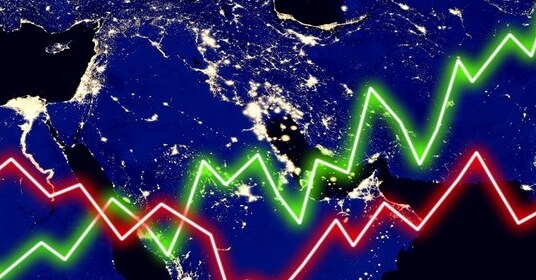Positive performance in the equity markets of the Gulf Cooperation Council (GCC) was driven by strong showings from Saudi Arabia and the UAE.
Following a significant downturn in May, the equity markets of the Gulf Cooperation Council (GCC) countries experienced a promising rebound in June, with the United Arab Emirates (UAE) and Saudi Arabia leading the way.
According to a report by Kamco Invest, the Dubai Financial Market (DFM) emerged as the best-performing market in terms of index closings, with a monthly increase of 6 percent. It was closely followed by Saudi Arabia’s Tadawul All Share Index, which recorded a rise of 4 percent. Kuwait’s market secured the third position with a 3.4 percent month-on-month increase, while Oman’s market saw a 3.1 percent incline.
On the other hand, Qatar’s market reported a decline of 0.8 percent, and Bahrain’s market experienced a slight dip of 0.3 percent.
The DFM concluded June with a market capitalization of 650.2 billion dirhams ($177 billion) and an index of 3,792 points. This positive result was driven by increases in six out of the eight indices, particularly in the financial, real estate, and industrial sectors.
Saudi Arabia’s Tadawul All Share Index (TASI) reached a closing high of 11,466.0 points on June 21, marking an impressive performance. However, it experienced a slight downward trend by the end of the month, closing with a gain of 4.0 percent at 11,459.0 points, according to the Kamco Invest report. The trading activity on TASI witnessed a decline in June due to the Eid holidays. The volume of shares traded dropped by 12.9 percent, reaching 4.1 billion, and the value of shares traded decreased to SR100.1 billion from SR136 billion in May.
Meanwhile, Qatar’s market continued its declining streak in June, with the QE General Index registering a marginal decline of 0.8 percent. This marked the fifth consecutive month of decline for the Qatari stock exchange, as mentioned in the Kamco Invest report.
Bahrain’s market, on the other hand, experienced a decline for the first time after three months of positive performance. The market closed June with 1,957.87 points.
The rebound in equity markets in the UAE and Saudi Arabia reflects renewed investor confidence and positive sentiment. These markets’ resilience and recovery from the previous month’s decline indicate a potential for continued growth and stability in the region. As economic conditions improve and investor optimism returns, it is expected that the GCC equity markets will continue to attract attention and contribute to the overall economic development of the region.
After a steep decline in May, the equity markets of the Gulf Cooperation Council (GCC) countries experienced an optimistic bounce back in June, with the United Arab Emirates (UAE) and Saudi Arabia emerging as the top performers. The positive trend indicated a renewed sense of confidence among investors in the region.
According to a report by Kamco Invest, the Dubai Financial Market (DFM) in the UAE demonstrated impressive performance, emerging as the best-performing market in terms of index closings. The DFM recorded a monthly increase of 6 percent, reflecting the robustness of the UAE’s financial sector. Following closely behind, Saudi Arabia’s Tadawul All Share Index (TASI) experienced a rise of 4 percent, further boosting market sentiments.
Kuwait’s market secured the third position in terms of growth, with a 3.4 percent month-on-month increase. This positive performance indicated the potential for investment opportunities and economic growth in the country. Similarly, Oman’s market witnessed a 3.1 percent incline, further reinforcing the upward trajectory of the GCC equity markets.
However, not all markets experienced the same level of growth. Qatar’s market reported a decline of 0.8 percent, reflecting ongoing challenges and uncertainties in the Qatari stock exchange. Bahrain’s market also saw a slight dip of 0.3 percent, marking its first decline after three consecutive months of positive performance.
The DFM’s strong performance in June was driven by increases in six out of the eight indices, including the financial, real estate, and industrial sectors. The market closed the month with a market capitalization of 650.2 billion dirhams ($177 billion) and an index of 3,792 points, highlighting the resilience and potential for growth in the UAE’s economy.
Saudi Arabia’s TASI reached a notable closing high of 11,466.0 points on June 21, reflecting a positive investor sentiment. Although the index trended slightly downward towards the end of the month, it still closed with a gain of 4.0 percent at 11,459.0 points. However, TASI trading activity experienced a decline in June due to the Eid holidays. The volume of shares traded dropped by 12.9 percent to reach 4.1 billion, and the value of shares traded decreased from SR136 billion in May to SR100.1 billion.
Qatar’s market continued its declining streak in June, with the QE General Index registering a marginal decline of 0.8 percent. This marked the fifth consecutive month of decline for the Qatari stock exchange, underscoring the challenges faced by the market and the need for ongoing measures to restore investor confidence.
Bahrain’s market witnessed its first decline after three months of positive performance, closing June with 1,957.87 points. While this decline signaled a temporary setback, it also emphasized the importance of continuous efforts to maintain stability and attract investment in the country’s financial markets.
The rebound in equity market performances in the UAE and Saudi Arabia indicates the resilience and potential for growth within the GCC region. As economic conditions stabilize and investor confidence strengthens, these markets are expected to continue attracting attention and contributing to the overall economic development of the region. Continued efforts to enhance transparency, regulatory frameworks, and investor-friendly policies will play a crucial role in sustaining the positive momentum and fostering long-term growth in the GCC equity markets.





